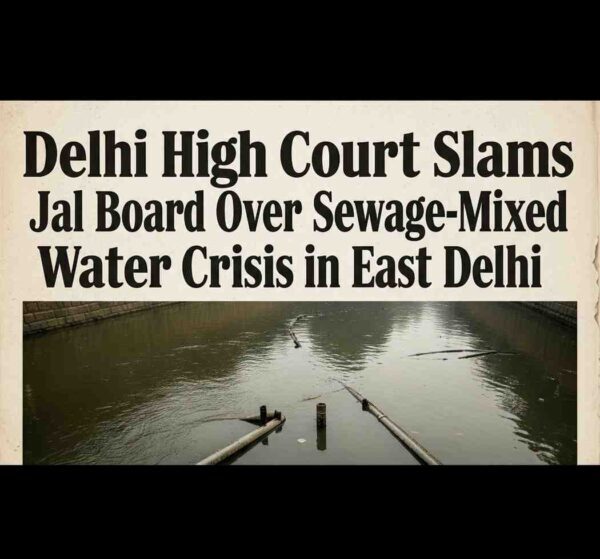The Delhi High Court has issued a stern condemnation of the Delhi Jal Board for supplying water contaminated with sewage to residents of East Delhi, marking a serious infringement of its statutory obligations and a flagrant disregard for the constitutional mandate to ensure the fundamental right to safe, clean, and potable water. Read the detailed report on the court’s observations, public health concerns, and directives for immediate action.
Delhi HC Rebukes Jal Board Over Contaminated Water Supply in East Delhi
In a forceful condemnation, the Delhi High Court admonished the Delhi Jal Board (DJB) for its gross negligence and failure to fulfill its statutory obligation to provide a safe and uncontaminated water supply to the residents of East Delhi. The reprimand came after reports and public grievances highlighted that residents in several areas of East Delhi were receiving sewage-mixed drinking water, posing a serious threat to public health and hygiene.
The court, during the hearing of a petition concerning water quality issues, expressed deep concern over the negligence displayed by the Jal Board. The bench stated that the situation was not just an administrative failure but a violation of the fundamental right to clean drinking water, which falls under the ambit of the Right to Life under Article 21 of the Indian Constitution.
Background of the Case
The matter was brought before the court following numerous complaints from residents of East Delhi, particularly areas like Shahdara, Laxmi Nagar, and Mayur Vihar. Citizens complained that tap water was visibly discolored, foul-smelling, and in some cases, tested positive for sewage contamination. Civic activists and local representatives also submitted photographic evidence and water sample reports showing high levels of pollutants and bacterial contamination.
The Delhi Jal Board, which is tasked with ensuring potable water to the National Capital, had previously promised remedial measures. However, recurring complaints signaled that the steps taken were insufficient or ineffective.
Court’s Observations
The High Court bench, presided over by Justice Suresh Kumar Kait, remarked that the response of the Delhi Jal Board demonstrated a conspicuous absence of due diligence and bona fide urgency in addressing the matter. The court was particularly disturbed by the fact that despite repeated warnings and mounting health risks, the issue was not treated as a public emergency.
“It is shocking that in the national capital of a country striving to be a global leader, residents are being subjected to such basic infrastructural failures,” the court observed.
It went on to say that the supply of sewage-contaminated water reflects gross mismanagement and raises serious questions about the internal monitoring and maintenance systems within the Jal Board.
The bench emphasized that the situation could lead to widespread outbreaks of waterborne diseases such as cholera, dysentery, and hepatitis, particularly affecting children, the elderly, and those with weak immune systems.
Directives Issued by the Court
The Delhi High Court directed the Delhi Jal Board to take immediate corrective measures. Some key directives included:
- Immediate Inspection: Conduct a thorough inspection of all pipelines in the affected areas to detect leakages or cross-connections with sewer lines.
- Water Quality Testing: Submit laboratory test reports of water samples from at least ten locations in East Delhi within a week.
- Public Notification: Inform residents through public announcements and advisories about the status of water safety and preventive measures.
- Accountability: Identify and take disciplinary action against officials responsible for negligence or inaction.
- Remedial Timeline: Submit a time-bound action plan outlining short-term and long-term solutions to prevent recurrence.
The court has set a follow-up hearing to ensure compliance and warned of stringent consequences if the orders are not implemented effectively.
Public Reaction and Political Fallout
The issue has provoked significant public outrage and condemnation from both local residents and numerous civil society entities, who have voiced serious concerns over the breach of fundamental rights and public health risks. Many have taken to social media to share disturbing images of brown, foul-smelling water coming from household taps. Resident Welfare Associations (RWAs) in East Delhi have demanded a complete overhaul of DJB operations in their zones.
Opposition political parties have seized the opportunity to slam the ruling AAP government in Delhi, under whose leadership the Jal Board operates. BJP leaders have accused the government of failing to provide basic amenities and demanded the resignation of senior officials within the DJB.
The Delhi government, meanwhile, has assured full cooperation with the court’s orders and promised swift action to rectify the issue. A senior DJB official stated that emergency response teams had been dispatched and water tankers would be supplied in the most affected areas until the pipelines were repaired.
Health Concerns and Preventive Steps
Health experts have advised residents to boil tap water before consumption and use water purifiers with strong filtration systems. Parents are being cautioned to prevent children from consuming untreated water, and local clinics have reported a spike in gastrointestinal complaints.
In the absence of clean water, bottled water demand has surged, putting financial pressure on low-income households. NGOs and community health workers have begun distributing hygiene kits and educating residents about safe water practices.
Conclusion
The Delhi High Court’s stern intervention highlights a fundamental governance challenge—ensuring safe drinking water in one of India’s most populous urban centers. As the city grapples with aging infrastructure, rising population, and climate-related stress on water sources, accountability and rapid response from public bodies like the Delhi Jal Board are more critical than ever.
The court’s action serves as a wake-up call, not just for Delhi but for urban administrations across the country, to prioritize water safety and public health with seriousness and transparency.

























